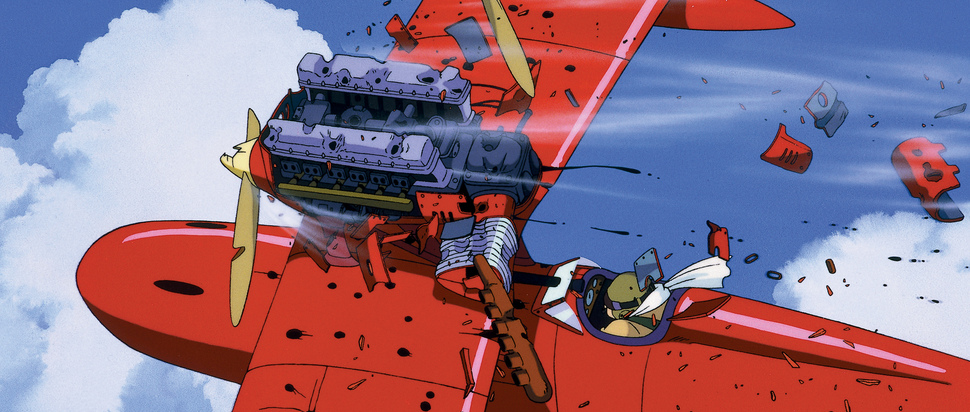I’d Rather Be a Pig Than a Fascist: 30 Years of Porco Rosso
Porco Rosso, Hayao Miyazaki's enchanting adventure film about a first world war fighter pilot who helps battle fascists in Italy, even though he's transformed into a pig-man, turns 30. We look back at this anti-war masterpiece
At a glance, Hayao Miyazaki's Porco Rosso seems like something of an outlier in Ghibli’s filmography. The fantastical worlds removed from our own time and space are replaced here by the decidedly fixed-point of 1930s Mussolini-era Italy. The story is one of Miyazaki’s own original creations as well, being based on his 1989 manga The Age of the Flying Boat rather than on an existing tale or mythology by another storyteller.
Most significantly, rather than starring a determined young woman, our eponymous protagonist is a gruff, sometimes morally ambiguous pig man who smokes, drinks, and enters the fray with a level of reluctance. Looking at the differences between this black sheep in the Miyazaki canon and his more popular works, one message becomes clear; this isn’t a film that emphasises action over passivity, and isn’t one that’s willing to pander to its audience.
In some senses, it feels as though Fio Piccolo, the young woman who helps fix Porco’s plane and insistently joins him on his adventures, is the more conventional hero of the film. She’s upbeat, compassionate, clever; a Ghibli girl through and through. Though this might have made the film a more overtly feminist text, it would have come at the cost of ignoring much of the discomfort and darkness that Miyazaki plays with beneath the sunny Mediterranean exterior. Fio is someone to aspire to, while Porco might be closer to who you really are, torn between your own personal comfort and the moral duty you find yourself burdened with when you become aware of any kind of injustice.
This hits harder because of the invisibility of the fascists. They aren’t moustache-twirling buffoons like the bumbling pirates or hotshot American Curtis, who are ultimately (like so many other Miyazaki ‘villains’) just flawed, selfish individuals. Instead, they lurk as an ever-present background threat without a single face, the war machine itself rather than any of the individual people driving it. Porco Rosso entered production as a simple in-flight film for Japan airlines, but when Miyazaki and his team heard stories from the war in Yugoslavia, it evolved into something more complex – they couldn’t just depict the flights and fights of the film without acknowledging what drove them.
And what of the pilots? Miyazaki would discuss the clash between his love of planes and hatred of aerial war more explicitly in The Wind Rises, but this tension is still ever-present in Porco; underneath all the fun lurks the fact that many of the planes exist to end lives. The dogfights between Porco and his many enemies make for some great animated spectacles, but the film doesn’t hesitate to remind you – despite the miraculous survival of the central characters through it all – that these characters are just as capable as Mussolini’s soldiers of turning their skill to the slaughter of innocent people if they were convinced effectively enough.
That is why Porco’s defiant, explicit refusal to engage with fascism, summarised by his now-iconic line "I’d rather be a pig than a fascist", is so important; you have to make a conscious effort not to let these systems swallow up those around you. It doesn’t matter whether you’re the gallant Hollywood hero that Curtis strives to be or an outcasted criminal kidnapping little girls for a ransom pay-out – you have a responsibility to fight against state-sanctioned injustice if you’re capable. Leaning back on being a ‘good’ or ‘bad’ person while avoiding true conflict isn’t going to cut it.
This is perhaps best communicated in the narrative by the nature of Porco’s curse itself. You may assume that the curse came about due to greed or hedonism, a la Pigsy from the legendary Chinese classic Journey to the West. Instead, the cause is much vaguer – all we see is that his best friend was killed in a dogfight, and that he has taken a half-man, half-animal form ever since. More explicitly, a press release revealed that Porco became ‘disillusioned with humanity’ after this incident, leading to his transformation – a far cry from a God or witch smiting him with their moral judgement.
By the close of the film, Porco has regained his human form, and in the grand tradition of The Wizard of Oz, it seems as though the power was with him all along. All he needed was the push to believe in humanity once again, and to find a reason to fight; his reversion to a human form doesn’t signal a return to the status quo, but a drive to improve it. Porco Rosso isn’t about breaking the curse – it’s about finding the will to fight against a cursed world.
Porco Rosso is streaming now on Netflix
